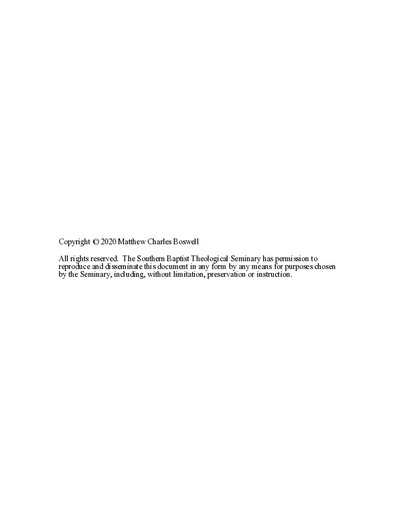| dc.contributor.advisor | Crookshank, Esther R. | |
| dc.contributor.author | Boswell, Matt | |
| dc.date.accessioned | 2020-05-13T19:13:38Z | |
| dc.date.available | 2020-05-13T19:13:38Z | |
| dc.date.issued | 2020-05 | |
| dc.identifier.uri | https://hdl.handle.net/10392/6079 | |
| dc.description | Ph.D. The Southern Baptist Theological Seminary, 2020 | en_US |
| dc.description.abstract | Charles H. Spurgeon (1834-1892) placed a high priority on hymnody as a pedagogical and doxological tool within the life and public worship of the local church. As pastor of London’s Metropolitan Tabernacle, he quoted hymns weekly in his sermons for decades. This dissertation, a mixed-methods study, documents the significance and extensive role of hymns in Spurgeon’s pastoral ministry, preaching, and editorial work in his hymnal, Our Own Hymn-book (1866). Original research consisted of an examination of his complete sermon output in the years 1866-1875 and compilation of a database of all hymn quotations and their themes. Chapter 1 establishes the need for the study, reviews the literature, and lays the biographical foundation for the study. Chapter 2 examines the pastoral lineage that Spurgeon inherited at Metropolitan Tabernacle by outlining the unique contributions to hymnody of his forbears: Benjamin Keach (1640- 1704; pastored from 1668-1704), John Gill (1697-1771; pastored from 1720-1771), and John Rippon (1751-1836; pastored from 1773-1836). This chapter places Spurgeon in his historical context, not as an innovator in song, but as the beneficiary of a theology of congregational singing. Chapter 3 discusses Spurgeon’s theological vision of singing as developed in his important teaching sermons on the subject. It considers his theological, philosophical, and methodological convictions with respect to the church in song. Chapter 4 interprets the hymn quotation data and analyzes the most frequently quoted hymns, demonstrating Spurgeon’s pedagogical use of hymn quotation as sermon illustration to be essential to his homiletics. Chapter 5 documents Spurgeon’s pastoral and editorial philosophy that shaped Our Own Hymn-book. Spurgeon’s four editorial aims, stated in the hymnal’s preface, serve as an outline of this chapter: (1) integrity of authorial intent; (2) a breadth of theological themes; (3) the inclusion of select gospel songs; and (4) the Psalms of David. Chapter 6 summarizes the robust role of hymnody over the course of Spurgeon’s life and ministry. | en_US |
| dc.subject.lcsh | Spurgeon, C. H. (Charles Haddon), 1834-1892 | en-us |
| dc.subject.lcsh | Hymns--History and criticism | en-us |
| dc.subject.lcsh | Hymns--Homiletical use | en-us |
| dc.title | The Singing Lion of London: Hymnody as a Pedagogical And Doxological Tool in The Pastoral Ministry of Charles Spurgeon | en_US |
| dc.type | Text | |
| dc.type | Electronic dissertation | en_US |
| dc.contributor.committee | Haykin, Michael A. G. | |
| dc.contributor.committee | Nettles, Thomas J. | |
| dc.type.qualificationname | Ph.D. | en_US |
| dc.publisher.institution | Southern Baptist Theological Seminary | en_US |
| dc.publisher.department | School of Church Ministries | |

